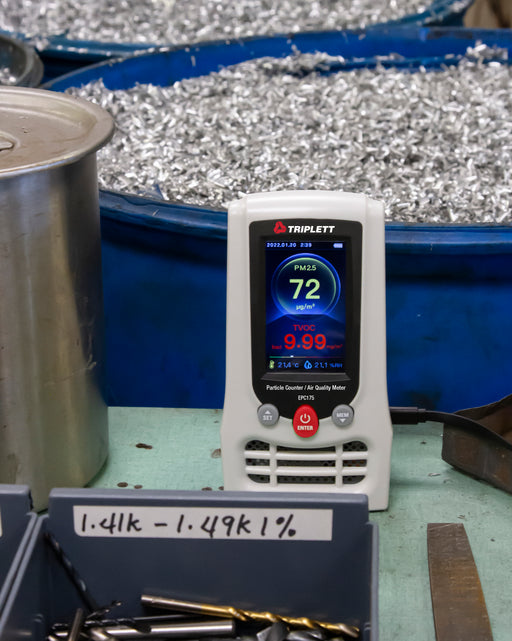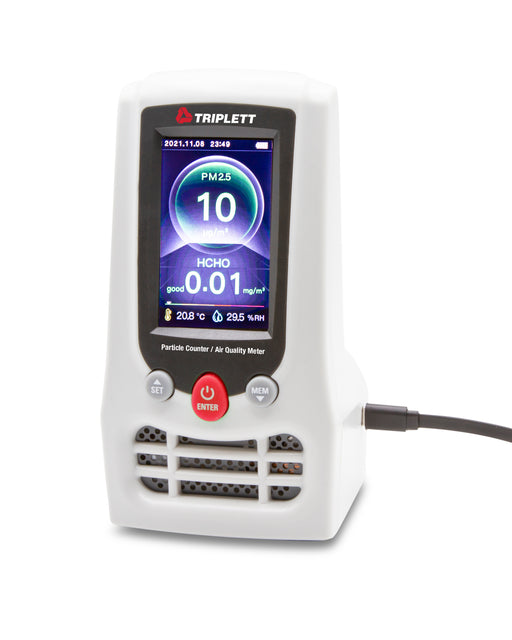Know More About Triplett Particle Counter
What is an air particle counter?
An air particle counter also called air particulate meter is a handheld device which measures the air particles based on their size. We offer portable air particle counters in various configurations. They also measure other parameters such as dew point, air temperature, relative humidity, and so on. Most of these models can measure five to six channels of particle sizes simultaneously and as small as 0.3µm. All of these are displayed on the counter screen at the same time.
How do particle counters work?
Handheld particle counters are portable and easy to use. Here are some pointers on their usage.
- They come with a simple push button menu and screen navigators. There are functional keys, ON/OFF keys, and Up, Down, and Enter buttons.
- They can be connected to another device such as a computer or an integrated device through the Internet, particularly wireless connectivity.
- Our particle counters are designed in compliance with FDA and NIST calibration standards which allow you to easily measure the concentration of particles in the air and remotely communicate with the connected device or system.
- You can use them to check specific spots in a room since they have their own display.
- There is a built-in camera for capturing images, a screen to display them, memory to store them, and software for remote connectivity and report generation.
- The air enters the device through a cavity on the top, and there is a sensor which senses and measures the particles. Also, the particles are categorized into sizes here. Five to six different sizes can be counted in one go and displayed on the screen.
- Press the Switch ON key for a few seconds to illuminate the display and switch on the meter.
- Before you begin, it is important to set the sensor to zero.
- Press F3 for settings. Set the counter for the right mode, cycle, interval, ambient temperature, channel display, level indication, and sample time. First try test runs and note the readings.
- Return to testing screen after done with the settings by using ESC key.
- Press RUN and test sequence will run on auto mode and the readings will be displayed on the screen accordingly.
What does a particulate counter measure?
Typically, particle air counters measure particulate matter present in air, even in very small sizes. It also measures specific spots or pockets in an indoor area and instantly offer the output. Along with this feature, our handheld particle counters also measure other air quality parameters such as temperature, relative humidity, and dew point.
What’s the difference between a particle counter and an air quality monitor?
Particle counters and air quality monitors are used for air quality measurements. They differ in terms of application. Here’s a breakdown of these differences:
- Measurement Focus: Particle counters measure the concentration and size distribution of airborne particles, such as dust, pollen, smoke, and particulates. However, air quality monitors assess various air quality indicators, including gases, such as CO2, ozone, VOCs, nitrogen dioxide, and more, as well as temperature, humidity, and particulate matter.
- Detection Mechanism: Particle counters employ optical or laser methods to detect and count particle sizes, such as PM2.5 or PM10. However, air quality monitors use various sensors to measure different air quality parameters. Electrochemical, chemical, and optical sensors are a few of the sensors used.
- User Base: Particle counters are used by specialists in controlled environments, such as clean rooms, hospitals, pharmaceutical processing facilities, and so on. However, air quality monitors are used by professionals and the general public.
What are the Applications of Particle Counter?
The popularity of particle counters has grown rapidly in recent years due to their ability to provide accurate and reliable measurements of airborne particles. Commonly referred to as particle testers, they monitor air quality in indoor and outdoor environments. By measuring the level of particulates in the air, particle counters can help to assess the air quality and identify potential pollution sources. Our most particle tester and air particle sensors are now used in various applications, ranging from monitoring indoor air quality to measuring the cleanliness of surfaces in cleanrooms. Following are the industries that benefit from air particle counters.
- Aerospace: In the aerospace industry, particle counters are used in various applications, from quality control to safety monitoring. For example, they are used to monitor the air quality in aircraft cabins and to inspect fuel tanks for contaminants. They are also used in the manufacturing process to ensure that parts and components are clean and free of contaminants.
- Pharmaceutical: The pharmaceutical industry is highly regulated to ensure the quality of medicines. Particle counters play an essential role in this process, as they can measure the size and number of particles in a sample. The unit is also used to investigate the formulation of a new drug or to monitor the manufacturing process of a drug.
- Hospitals: The particle counters are used to monitor air quality to control the spread of airborne pathogens in critical areas, such as operating rooms, patient isolation areas, pharmacy compounding rooms, and ICUs. These devices validate compliance with standards set by the World Health Organization (WHO) and the Centers for Disease Control and Prevention (CDC).
- Food and Beverage: Particle Counters can be used to measure the particulate matter in food and beverage products. They can also be used to monitor production environments for cleanliness and identify the possibilities of cross-contamination between products.
- Scientific Research: In scientific research, particle counters are used to study various topics, such as air pollution, water pollution, and the effects of dust on the environment.
- HVAC Systems: Particle counters help control air quality in buildings, such as schools, hospitals, and offices to filter out harmful particulates like mold, dust, and allergens. Monitoring particulate levels allows HVAC professionals to assess the performance of ducts, filters, and fans.
- Cleanroom Manufacturing: Cleanrooms must adhere to stringent cleanliness standards, such as ISO 14644, specifying allowable particle levels. Even the smallest contaminants can ruin products semiconductors, pharmaceuticals, and biotechnology industries. Particle counters help maintain ultra-low levels of particulate matter in cleanroom environments.
What are the Factors to Consider When Choosing the Right Particle Counter?
When it comes to choosing the right particle counter for your needs, there are a few important factors to consider.
- The first is the size of the particles you need to measure. Some particle counters are only able to measure particles that are larger than a certain size, so it's important to make sure that the counter you choose can measure the size of particles you're interested in.
- Different models of particle counters have different flow rates. The flow rate is the rate at which air or other fluid is moving through the device. The higher the flow rate, the more particles can be detected.
- Some particle counters can only detect particles of a certain composition. If you're interested in monitoring particles of a specific composition, make sure to choose a counter that is built for the purpose.
- When choosing a particle counter, it is important to consider the monitoring environment, as this can have a significant impact on the performance of the unit. Factors to consider include the size of the space to be monitored, the level of dust or other particles present, and the temperature and humidity of the space.
By taking all of these factors into account, you can ensure that you choose a particle counter that will meet your specific needs and provide accurate results.
Browse More Building, Maintenance & Environmental Collections
Inspection & Laser Distance Meters:
| Borescope Inspection Camera | Photo & Contact Tachometers |
| Manometers | Laser Distance Meters |
Gas Meters:
| Natural Gas Detector and Pen | Formaldahyde Meters | Co & Co2 Meters |
Environmental Meters:
| Sound & Noise Level Meters | Humidity Indicators & Meters | Non-Contact & Contact Thermometers |
| Air Flow Meter Anemometers | Hygro-Thermometers | Digital Hygrometer |
| Moisture Meters | Digital Lux Meters |
Water Quality:
| PH and Conductivity Meters |







